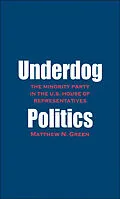In the first comprehensive study of the subject in decades, political scholar Matthew Green disputes the conventional belief that the minority party in the U.S. House of Representatives is an unimportant political player. Examining the record of the House minority party from 1970 to the present, and drawing from a wide range of quantitative and qualitative data, Green shows how and why the minority seeks to influence legislative and political outcomes and demonstrates that the party's efforts can succeed. The result is a fascinating appreciation of what the House minority can do and why it does it, providing readers with new insights into the workings of this famously contentious legislative chamber.
Zusammenfassung
In this comprehensive analysis, political scholar Matthew N. Green disputes the widely held belief that the minority party in the U.S. House of Representatives wields little or no legislative influence. Green has examined the record of House minority party members from 1970 to the present and offers empirical evidence of their important role in passing or blocking controversial legislation, often through active floor protests, press conferences, obstructionism, and other means. The author explores such spheres of minority influence as fundraising, candidate recruitment, and the shaping of public policy through well-orchestrated campaigns. In addition to analyzing minority party voting behavior on key floor votes and procedural motions, Green supports his findings through information gleaned from a wide variety of original data, including documents and memos from congressional archives, media accounts, and personal interviews with current and former lawmakers and their staff. The result is the first systematic analysis of what the House minority party can do and why it does it, offering a clear and insightful picture of the inner workings of this famously contentious chamber of Congress.
Zusammenfassung
In this comprehensive analysis, political scholar Matthew N. Green disputes the widely held belief that the minority party in the U.S. House of Representatives wields little or no legislative influence. Green has examined the record of House minority party members from 1970 to the present and offers empirical evidence of their important role in passing or blocking controversial legislation, often through active floor protests, press conferences, obstructionism, and other means. The author explores such spheres of minority influence as fundraising, candidate recruitment, and the shaping of public policy through well-orchestrated campaigns. In addition to analyzing minority party voting behavior on key floor votes and procedural motions, Green supports his findings through information gleaned from a wide variety of original data, including documents and memos from congressional archives, media accounts, and personal interviews with current and former lawmakers and their staff. The result is the first systematic analysis of what the House minority party can do and why it does it, offering a clear and insightful picture of the inner workings of this famously contentious chamber of Congress.
Titel
Underdog Politics
Untertitel
The Minority Party in the U.S. House of Representatives
Autor
EAN
9780300182262
ISBN
978-0-300-18226-2
Format
E-Book (epub)
Hersteller
Herausgeber
Genre
Veröffentlichung
28.01.2015
Digitaler Kopierschutz
Adobe-DRM
Anzahl Seiten
288
Jahr
2015
Untertitel
Englisch
Unerwartete Verzögerung
Ups, ein Fehler ist aufgetreten. Bitte versuchen Sie es später noch einmal.
